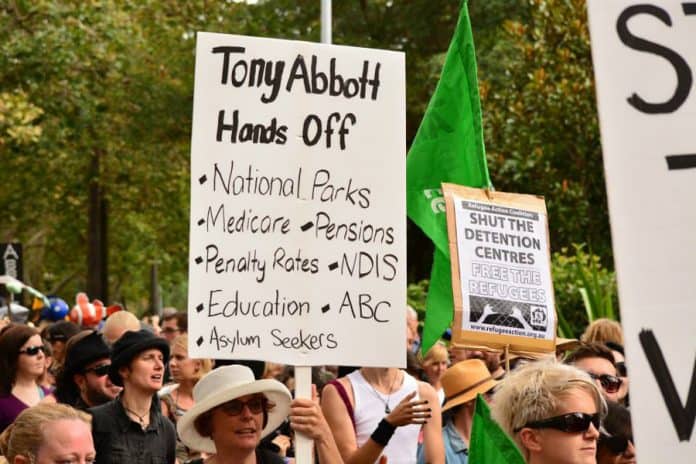The phenomenal turnout at the March in March rallies shows the possibilities for a fightback against Tony Abbott. Organisers estimate 115,000 people took part across the country.
Even small towns like Castlemaine and Byron Bay held demonstrations that drew many hundreds of people. Melbourne’s march was up to 30,000 strong.
These are the largest demonstrations, apart from trade union mobilisations, since the Howard years. What is all the more remarkable is that the marches had next to no institutional support from the unions, the Labor Party, The Greens or even the far left. They were simply organised through Facebook, largely by people without links to the existing left.
Abbott has had the worst start for any new government in 40 years. His government continues to fall in the polls. The latest Morgan poll shows a two party preferred vote favouring Labor by 54.5 per cent to 45.5 per cent. The Coalition expected an easy win in South Australia but Labor hung on to form a minority government. The Senate election in Western Australia looks like it will also be a setback for Abbott.
Now, Abbott’s Assistant Treasurer, Arthur Sinodinos, has been forced to step down after revelations of his alleged involvement in corruption when he was a director of Australian Water Holdings.
Sinodinos was earning $200,000 a year at the company for around two hours work a week. As if that wasn’t enough, he also stood to grab a bonus of $20 million if a shady deal with the then Labor state government had gone ahead.
Abbott declared, “I look forward to his restoration to the ministry”, but that’s not likely.
The decision to restore royal titles shows just how much Abbott is driven by his own conservative worldview.
His vindictive rule for the rich agenda has not let up. Abbott recently used a bill about government bureaucracy (his “red tape repeal” bill) to quietly slash the wages of government contract cleaners by between $172 and $225 a week—up to a quarter of their weekly wage.
March in March showed the possibilities of fighting such cuts, and his planned cuts to services such as Medicare, and attacks on the union movement.
It also showed the possibilities of making sure Abbott is a one-term Prime Minister.
Labor’s failure
But it couldn’t be clearer that we can’t rely on Labor. The Labor leadership has been shocking on refugees and supports the Liberals’ efforts to “stop the boats”. And they continue to champion the detention horror of Manus Island as a Labor government achievement (see p6).
Shamefully, Bill Shorten distanced himself and Labor from the March in March protests—he was more concerned to keep the conservative editorial writers on side than he was to be associated with the very obvious anti-Abbott anger on the streets.
But that is where the power to beat Abbott lies.
The Greens are talking up the prospect of stopping Abbott in the Senate if they hold onto their seat in the WA Senate election re-run. Everyone should vote Green in WA, but the truth is Abbott is likely to be able to cobble together a majority by going to Clive Palmer and the other micro-parties in the Senate, without needing to talk to The Greens.
To stop Abbott The Greens need to mobilise their members to build grassroots protests and campaigns outside parliament.
March in March gave us a flavour of what such a fightback on the streets could look like. But ongoing campaigning is going to be needed to force Abbott back, not just a focus on the next election.
Imagine if the unions had called protests and mobilised the tens of thousands of organised workers as they did in the “Your Rights At Work” campaign demonstrations against Howard. That’s what everyone concerned to get rid of Abbott now needs to work for.
But to get such a response there is going to have to be pressure on the union leaders to act.
March in March drew people concerned about education, cuts to local hospitals, climate change and the environment. There are grassroots campaigns already around refugees, Medicare, and cuts to single parents’ benefits.
We need to fan every flame of resistance to Abbott—to build more protests, to fight any budget cuts and support every fight for jobs.
Everyone who marched in March should join the Palm Sunday refugee marches and march again on May Day.
Abbott can be beaten, but to build a real alternative we need socialist organisation in every campaign, every university and every workplace to argue to link the individual campaigns with the power of organised workers and fight for a society that produces for need, not greed.




